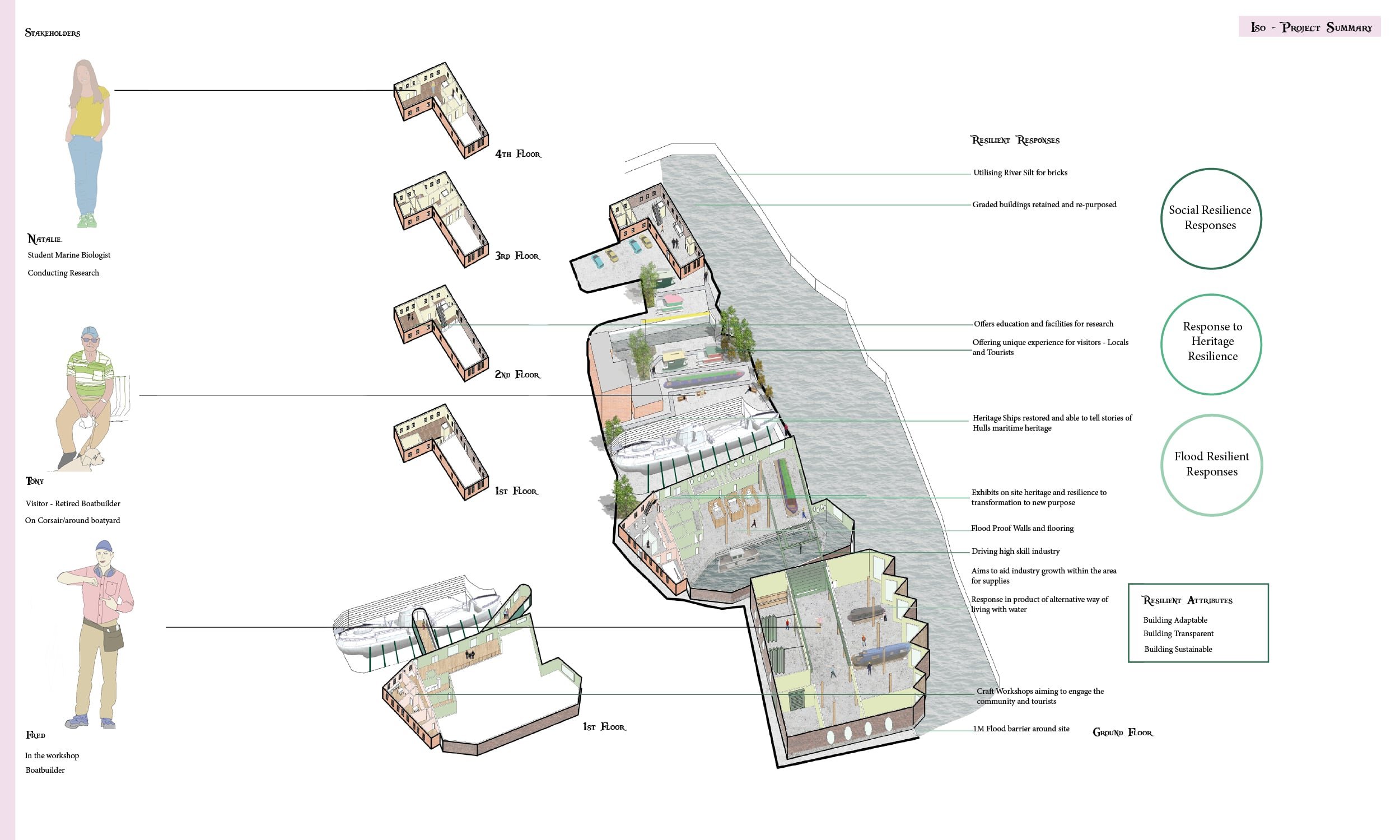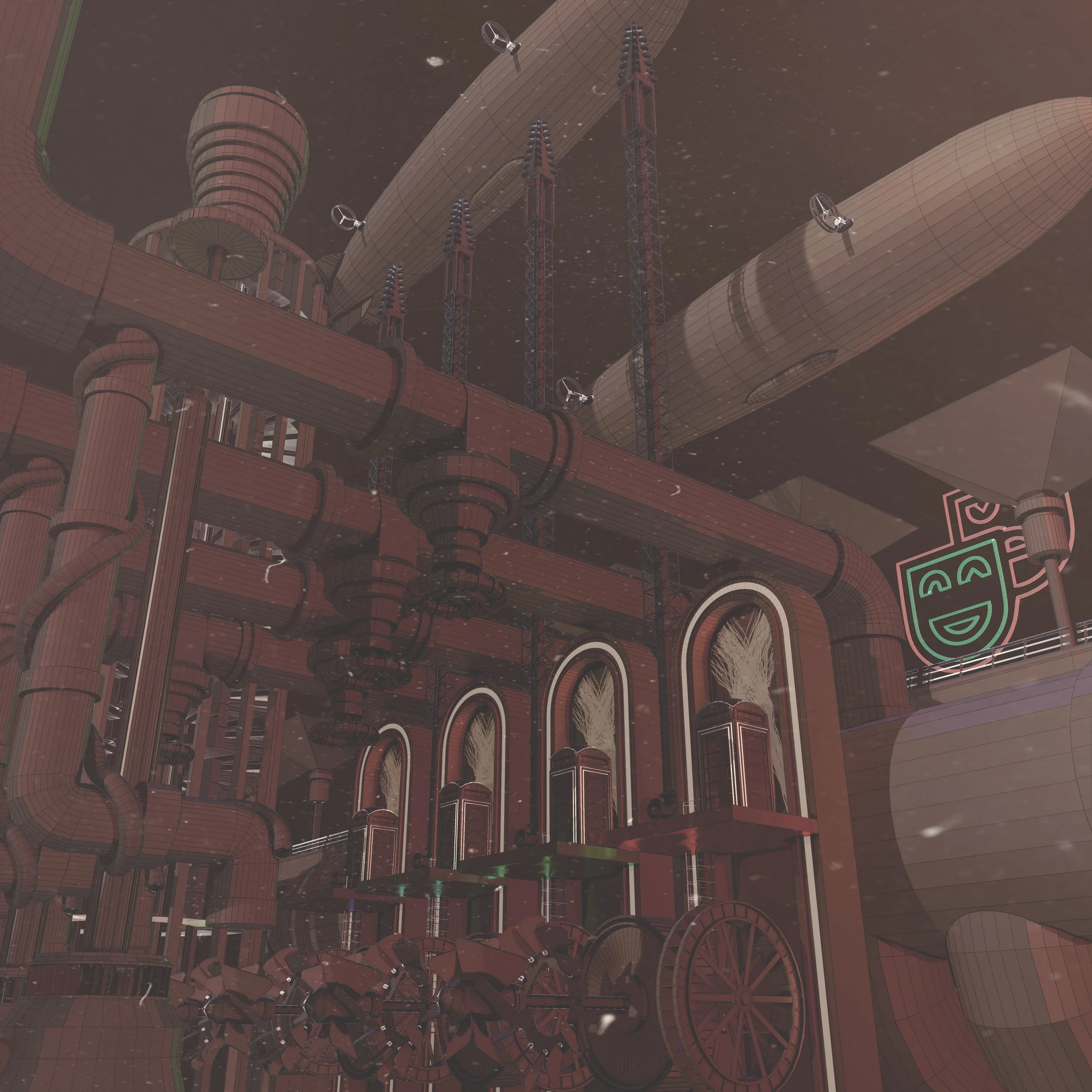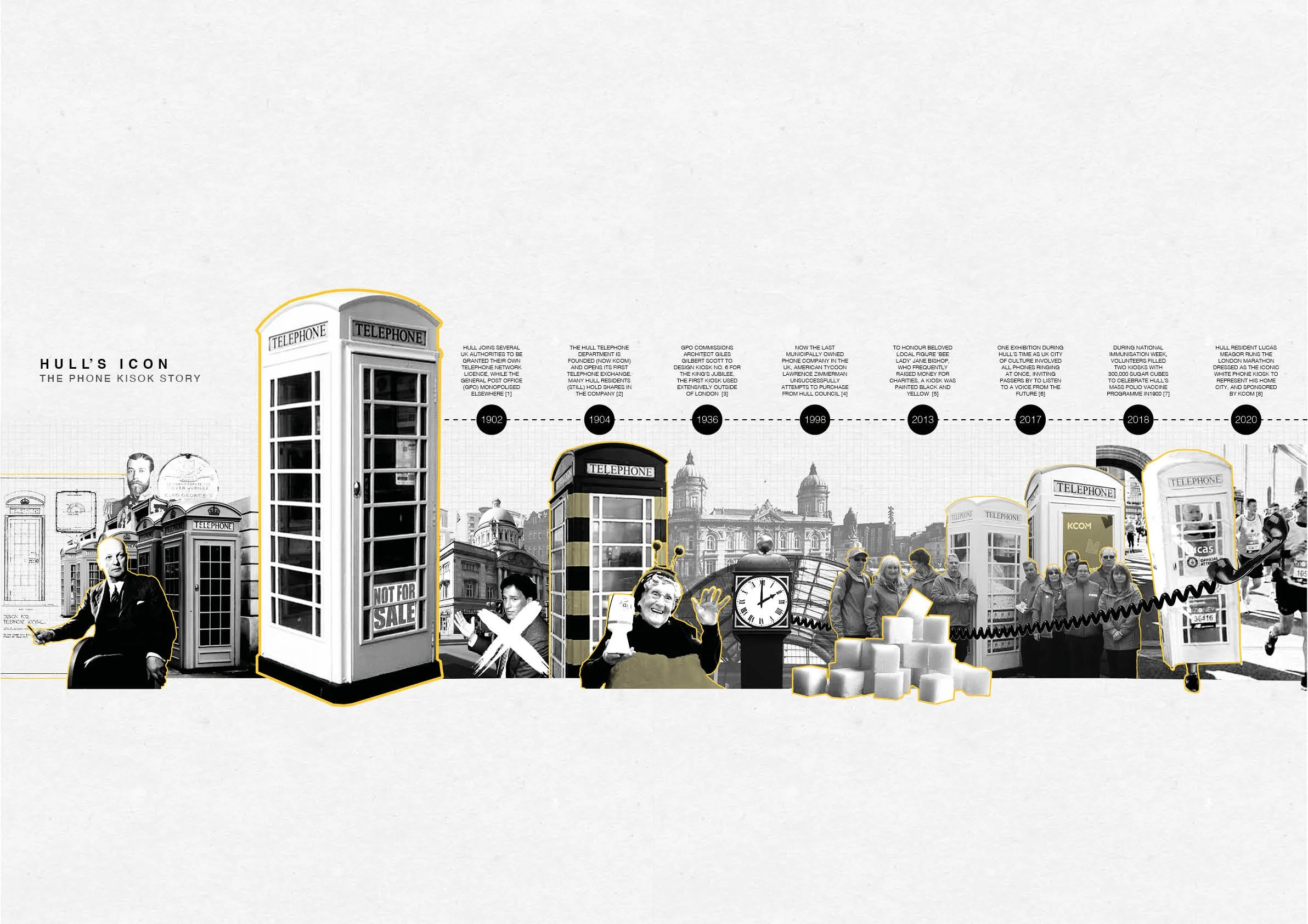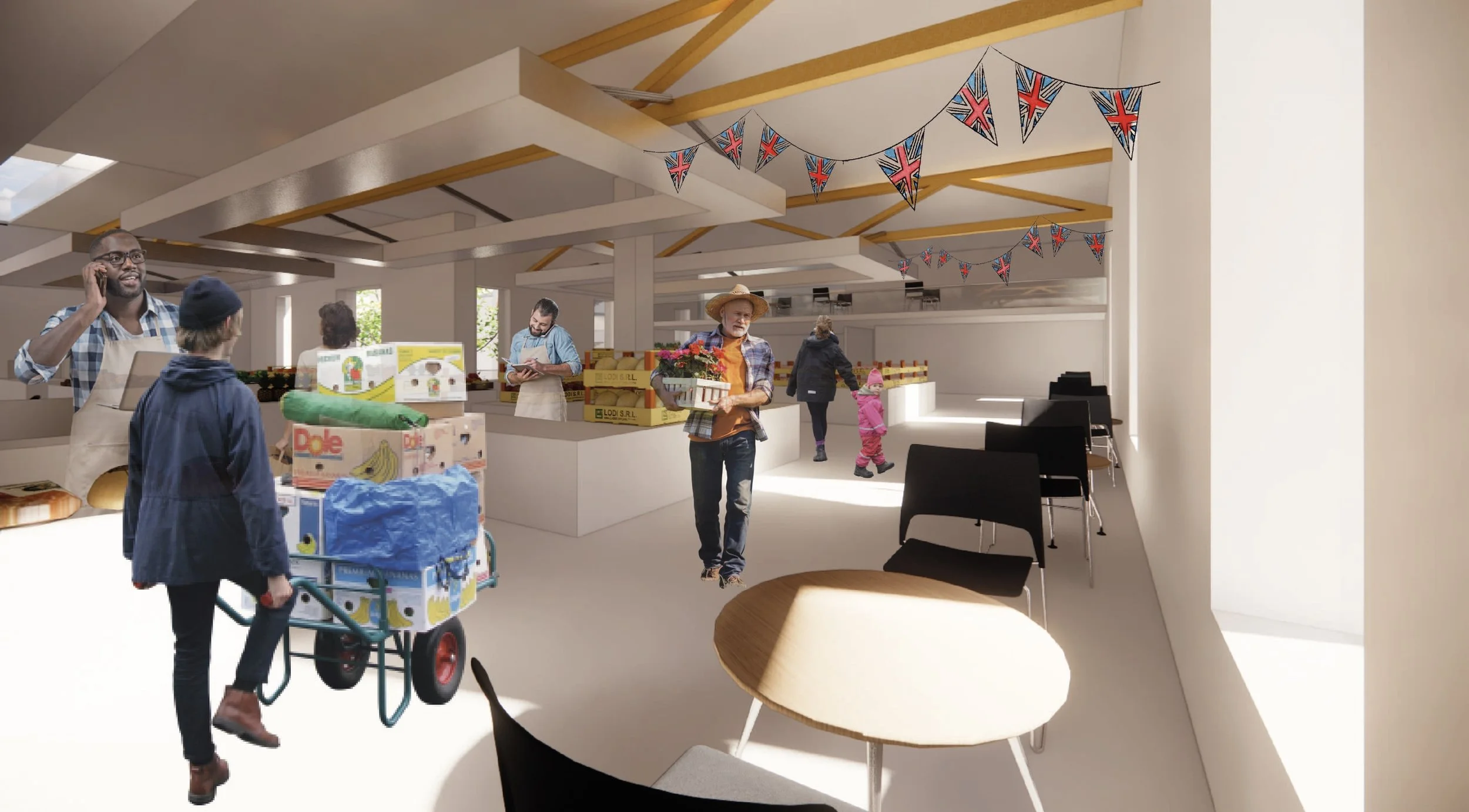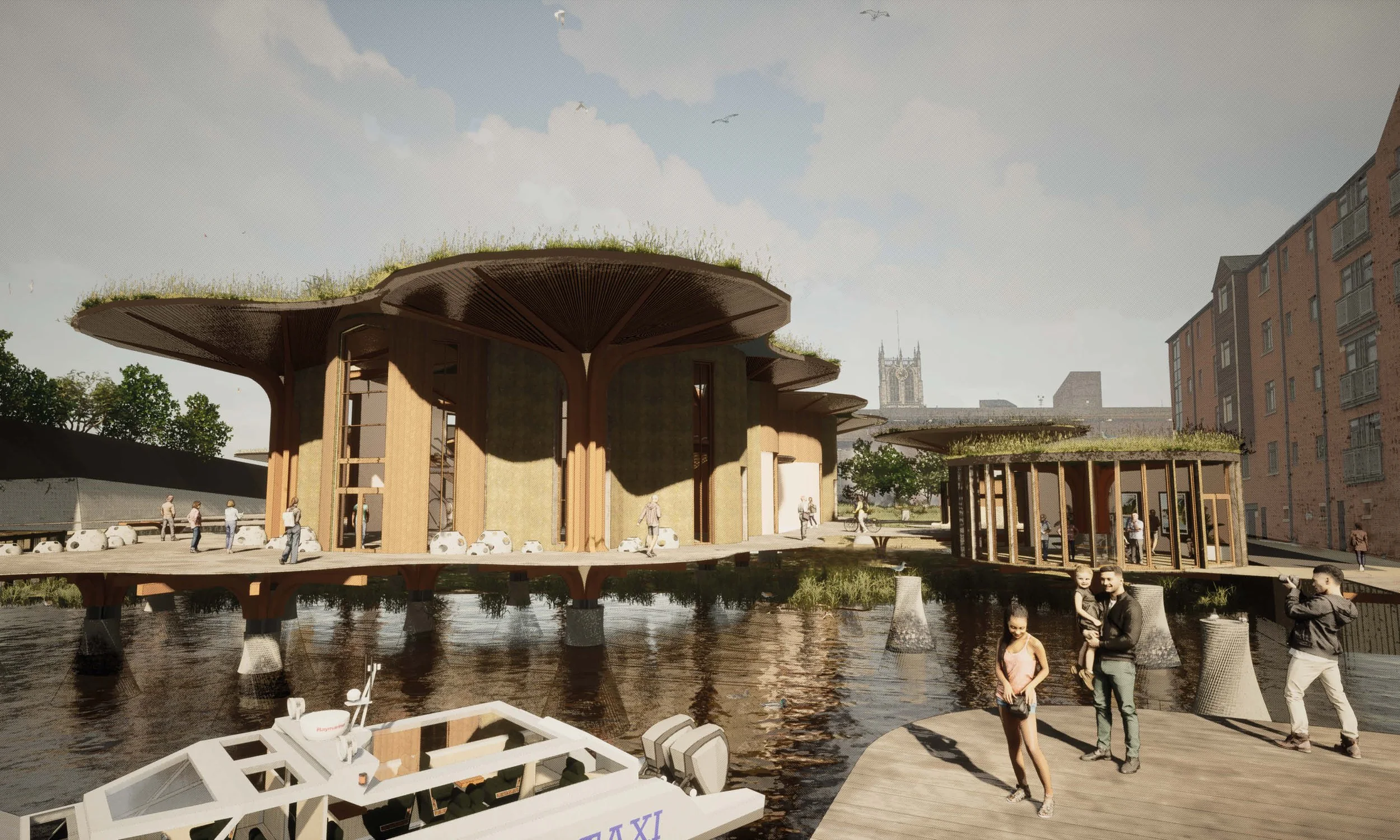DS3
Resilient by design
There is an ontological shift in environmental thinking that questions the viability of the conservation goals of the sustainability paradigm, and offers the adaptation goals of resilience as a more flexible framework for intervening in increasingly complex and unknown futures. In DS3 we explore the relevance, potential and application of the resilience paradigm for architectural design and adaptation of our urban environments. This year’s site was the city of Kingston-upon-Hull and students used two key approaches to locate and integrate theories of resilience into a people and city focussed scale. The first was the creation of a fictional, yet research derived, resilience scenario. The second was the extensive use of stakeholder mapping and narratives. Characters were created and developed to experience the imagined scenarios, their personal resilience and their use of each student’s final design proposition.
Studio tutors:
Alex Towler, Melissa Kinnear, Julia Wedel, Jason Coleman, Andy Thomson
Guest tutors:
Annika Grafweg, Ubada Muti
Students
Mohammed Al-Ali, Hussein Ali, Luka Kai-Yen Chang, Stefania Gaudyn, Emily Holland, Rania Kapitani, Foteini Kapsi, Alice Latham, Louisa Marley, James Mear, Hager Mohammad Jawad, Anjola Owonibi, Caroline Sait, Barnaby Turner
Hussein Ali: Resilience in Hull & Humber Valley through connection: Sustainable Transport & Mobility Hub - Reconnecting Hull for the future. Introducing a sustainable transport & mobility hub which aims to better connect the derelict but highly residential area of East Hull with the Old Town and beyond West Hull through physical, digital and social connection while proposing new sustainable forms of transport to the existing network.
Louisa Marley: Resilient Systems - The North End Shipyard - Houseboat building workshop with heritage and current use exhibitions and research centre. Site Heritage buildings are retained and repurpoursed.
Caroline Sait
James Mear: Orchard Park Resource & Enterprise Centre - A resource and enterprise centre, with four core programmes: Community Kitchen, Workshops, (Both wood and ceramic), study spaces and a childcare facility. Giving Orchard Park residents the resources they need to start their own enterprises, while alleviating physical and social barriers the community face.
Foteini Kapsi
Anjola Owonibi: Hull's Flood Resilient Way of Public Transport - This project seeks to create a Creative Hub for the local Artists in Hull which houses a more resilient form of public transportation in the new neo-Venice that Hull is set to become by the year 2040.
Alice Latham: Hull's Green Co-Operative Centre - Hull’s Green Co-operative is a bottom-up community-led organisation looking to combat Hull’s green paradox, in order to safeguard the future of Hull’s trade system against the threat of the climate crisis. The architecture encompasses Cradle to Cradle ideology to create a resilient place for the future of trade.
Barnaby Turner
Mohammed Al-Ali: Organic Cloud Resilience - Crypto Mining Facility designed in with industrial yet secular aethetic to explore Hull's capability to host/mine its own cryptocurrency using green energy. The water oriented secular spaces use the flooding water from River Hull in a scenario of Hull in 2030 where Flood risks rise higher due to climate change. The water generates the neccessary hyrdoelectic energy as well as it cools down the crypto mining rigs and the waste hot water released is used to provide free hot water to local businesses who support the new social/economic movement. The space/ landmark infrastructure will also host Hull Annual Festival. It uses the water stored to provide water entertainment with lights as part of the activities hosted in the new developed Victoria Pier.
Foteini Kapsi
Louisa Marley: Resilient Systems - The North End Shipyard - Houseboat building workshop with heritage and current use exhibitions and research centre. Site Heritage buildings are retained and repurpoursed.
Barnaby Turner
Mohammed Al-Ali: Organic Cloud Resilience - Crypto Mining Facility designed in with industrial yet secular aethetic to explore Hull's capability to host/mine its own cryptocurrency using green energy. The water oriented secular spaces use the flooding water from River Hull in a scenario of Hull in 2030 where Flood risks rise higher due to climate change. The water generates the neccessary hyrdoelectic energy as well as it cools down the crypto mining rigs and the waste hot water released is used to provide free hot water to local businesses who support the new social/economic movement. The space/ landmark infrastructure will also host Hull Annual Festival. It uses the water stored to provide water entertainment with lights as part of the activities hosted in the new developed Victoria Pier.
Alice Latham - Hull's Green Co-Operative Centre - Hull’s Green Co-operative is a bottom-up community-led organisation looking to combat Hull’s green paradox, in order to safeguard the future of Hull’s trade system against the threat of the climate crisis. The architecture encompasses Cradle to Cradle ideology to create a resilient place for the future of trade.
Caroline Sait
Luka Kai Yen Chang: Vertical City Centre - This project is an idea for the cities of the future. A future where cities are occupied by water. It showcases life between the people and the water, and how they integrate with a vertical city.
Emily Holland: Pioneering the Symbiotic Shift - The Regeneration of Nature in Kingston Upon Hull - Hull is transitioning from conflicting with nature to approaching a future symbiosis - where urban areas allow nature to flourish rather than working against it. The 'living system structures' mimic nature, acting as an ecosystem and form the Saltmarsh Institute buildings.
Emily Holland: Pioneering the Symbiotic Shift - The Regeneration of Nature in Kingston Upon Hull - Hull is transitioning from conflicting with nature to approaching a future symbiosis - where urban areas allow nature to flourish rather than working against it. The 'living system structures' mimic nature, acting as an ecosystem and form the Saltmarsh Institute buildings.
Mohammed Al-Ali: Organic Cloud Resilience - Crypto Mining Facility designed in with industrial yet secular aethetic to explore Hull's capability to host/mine its own cryptocurrency using green energy. The water oriented secular spaces use the flooding water from River Hull in a scenario of Hull in 2030 where Flood risks rise higher due to climate change. The water generates the neccessary hyrdoelectic energy as well as it cools down the crypto mining rigs and the waste hot water released is used to provide free hot water to local businesses who support the new social/economic movement. The space/ landmark infrastructure will also host Hull Annual Festival. It uses the water stored to provide water entertainment with lights as part of the activities hosted in the new developed Victoria Pier.
Rania Kapitani: Hull's Natural Flood Management Center

